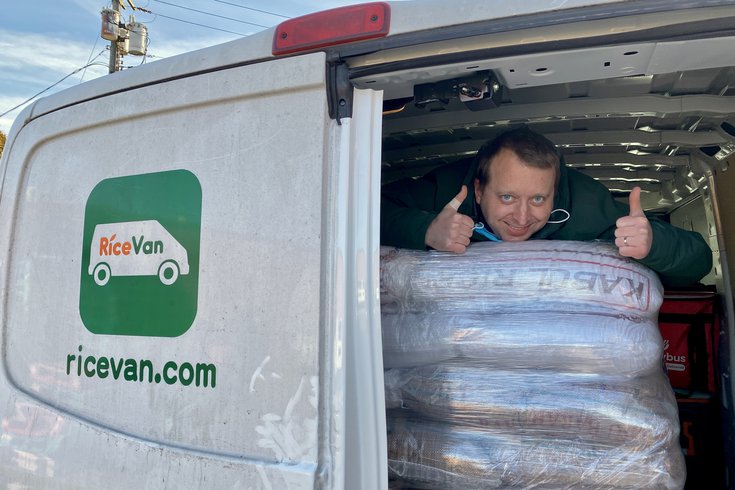
January 18, 2022
 Mike Prince/RiceVan
Mike Prince/RiceVan
Eric Rosenfeld, the business partner of RiceVan founder Dan Tsao, in the company's delivery vehicle. RiceVan, which brings hard-to-find groceries and pre-prepared meals from Philly to the suburbs, is doing a lot for refugees from Afghanistan living in the U.S. including providing culturally appropriate food and job opportunities.
A Philadelphia delivery service that provides immigrants and refugees food from their native countries is taking some of the region's newest arrivals under its wing.
RiceVan, which brings prepared meals and hard-to-find groceries from Center City to people up to 60 miles away, has made supporting Afghan refugees a priority.
The company has hired five refugees from Afghanistan, which is experiencing a humanitarian crisis following the U.S. withdrawal last year. Over the last three months, RiceVan also has provided thousands of daily meals to hundreds of refugees – many of them Afghans – who are living in temporary housing in Center City.
"I was an immigrant myself, and I went through the journey of coming here," said RiceVan's founder Dan Tsao said. "I understand how difficult things are for these people."
His business partner Eric Rosenfeld added, "When someone is violently displaced from their home, having familiar food can help reduce stress and provide a sense of continuity."
Tsao started RiceVan in May 2020 after his restaurant businesses, including EMei in Chinatown and General Tsao’s House in Rittenhouse, had to shut down amid the COVID-19 pandemic.
Its initial focus was on bringing East Asian food and groceries to people living in Philly's suburbs, far from Chinatown, but it has since expanded to include halal food as well. Halal is a set of dietary restrictions many observant Muslims follow, including most of the Afghan refugees.
Initially, RiceVan was sourcing its halal meals from other Philly restaurants, but recently Tsao created a halal station at General Tsao's House, so most of those are now made in-house as well.
Tsao also has gone as far as finding a source in New York City for a specific kind of long-grain basmati rice that's central to many Afghan dishes.
RiceVan is carrying out this work with two refugee resettlement agencies, Nationalities Service Center and HIAS Pennsylvania. The agencies pay RiceVan to handle all of their culinary needs.
The company also has established its own refugee relief fund to aid Afghans living in their home country and refugees who came to the U.S.
In the wake of the American withdrawal from Afghanistan, Taliban forces retook the country in a matter of days, leaving many desperately trying to escape the land-locked nation.
Now, the country is facing a huge famine aggravated by reduced foreign aid, financial sanctions and a prolonged drought. The United Nations World Food Program has warned that only 2% of the population has enough food to eat.